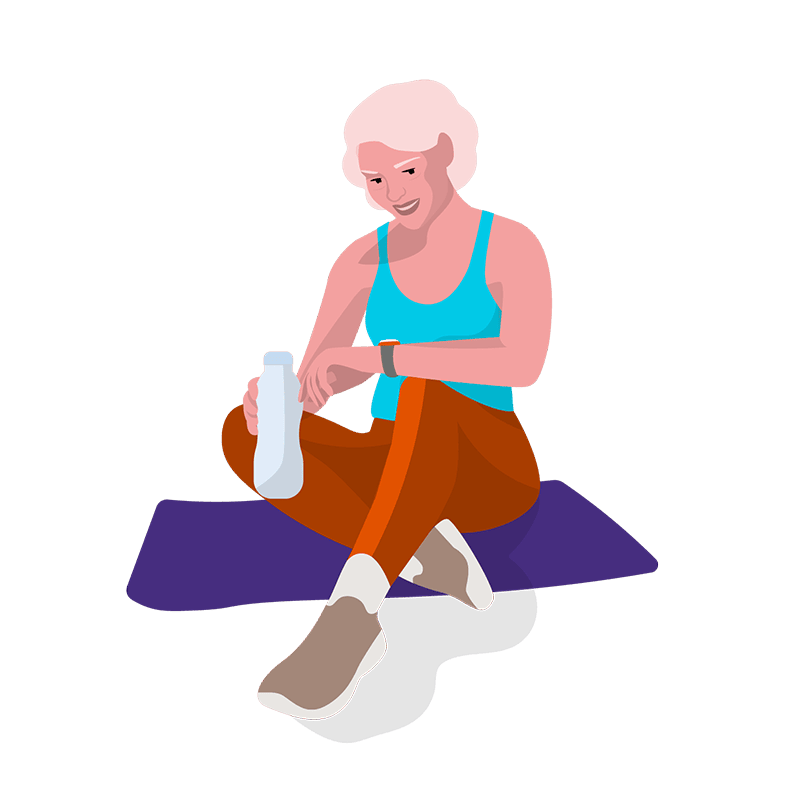Women can experience a range of symptoms before, during and after menopause. From hot flushes and night sweats to heightened anxiety, joint pain and memory loss. So it’s little wonder that, in a British Menopause Society survey, three quarters of women surveyed said that menopause has caused them to change their life, and more than half said it had had a negative impact on their lives, both at home and at work.1
With women taking an estimated 14 million working days off every year to alleviate symptoms2, menopause is an important topic for businesses to address. While menopause wellbeing services are becoming established in the workplace, it’s important to make sure that your employees are supported with the right care. Helping your employees look after their health and wellbeing will encourage a healthy, more engaged3 and productive workforce.
Currently, there are around 12.5 million women in the UK who are in perimenopause, menopause or beyond.

Explaining menopause
Menopause is the time when a woman’s ovaries are no longer producing eggs and her periods have stopped. Officially, it's said to have occurred 12 months after she’s had her last period. Women may begin to experience symptoms in the run up to the menopause, during what's known as the perimenopause. These symptoms are caused by changes to hormone levels as the ovaries start to produce fewer eggs and secrete fluctuating and lowering amounts of the female sex hormone, oestrogen.
The average age for menopause happening is around 51 years, typically at any time between the ages of 45-55.
If menopause happens before the age of 45, it’s called early menopause. This sometimes needs quite specific management, depending on how young a person is, to help mitigate the loss of oestrogen from the body.
Menopause signs and symptoms
Menopause reduces the body’s production of oestrogen, which impacts every part of the body, from the brain down to the feet.
There are 37 symptoms of menopause, which can be divided into 3 clusters: physical, psychological and emotional symptoms. The number and frequency of symptoms vary hugely amongst women, as does the impact, duration and severity. Below are some common symptoms experienced by women during the menopause:

The number and frequency of symptoms vary hugely, as do the impact, duration and severity. Women can be affected primarily by just one cluster of symptoms, for example emotional symptoms with low or depressed mood, heightened anxiety, panic attacks and increased aggression. Others may experience symptoms from each of the groups, including physical problems and musculoskeletal issues as well as cognitive decline and emotional struggles.
So, what's normal?
Menopause affects women in different ways, no matter when it happens for them. There's no clear definition of what a 'normal' or 'abnormal' response to menopause is but, when a woman finds she is struggling with symptoms, then ideally she should be able to ask for help and get support.
Collectively, the impact of menopause on women can have an organisation-wide impact on talent retention, productivity and employer brand. Closer integration between diversity, equality and inclusion (DEI) and wellbeing strategies enables better alignment with your wider business goals. It also improves employee engagement and working culture. If a woman is supported at work, working relationships and review structures can help reveal even subtle changes in performance and behaviour in the workplace.
1 in 4 women consider leaving the workplace because of their menopause symptoms.4 It’s important to support them so that their talent and knowledge doesn't leave your business.
Unfortunately, too many women still feel stigmatised when they reveal their menopausal struggles in the workplace. And this can mean they hold back from seeking support, which can lead to a delay in treatment and recovery. Ideally, women should be fully informed as they move through menopause, and therefore empowered to act at an earlier stage rather than wait till the situation becomes unmanageable.
Most women will experience fluctuating mild to moderate symptoms over about 10 years, which will generally be manageable without medical intervention. But a significant minority of women will experience moderate to severe symptoms which will significantly affect their lives.
It’s estimated that 15% of menopausal women are currently seeking professional help and advice for their symptoms and many will have started hormone replacement therapy (HRT). But current trends in prescribing indicate that, over the coming decade, uptake of menopause advice, including HRT, is likely to escalate. Some experts believe that up to 50% of women may end up trying HRT at one point in the future.
Diagnosis and treatment
Given the wide range of symptoms, there's no 'one size fits all' solution for menopause problems. Each person's experience is driven by various factors, including genetic inheritance, and it's worthwhile for women to explore their menopause family history as this can be a helpful prediction.
It's also important that women can get full information from a trained menopause specialist. This will help them explore all their support, guidance and treatment options in the round.
For example, HRT shouldn't be seen as the only solution to menopause problems. It works best in women who are already addressing the other underlying health concerns which can be associated with menopause, such as changes in weight, loss of muscle tone and lack of activity. These carry significant long-term health risks and can contribute to less-than-optimal health during menopause and beyond.
It's also true that, because menopausal symptoms are complex and can start happening many years before periods finally stop, accurate diagnosis is often difficult.
Unfortunately, due to a lack of robust mandatory menopause training for medical students and doctors, there has been a cumulative deficit in care provided to women. But menopause awareness has been boosted recently thanks to campaigning by bodies such as the British Menopause Society, as well as high-profile personalities, and the emphasis is changing. Menopause training is now mandatory for all trainee doctors, although it will take time for this to feed through to healthcare at both primary and secondary levels.

As menopausal symptoms tend to come on gradually and incrementally over time, it can take a while for women to become aware that there is a genuine underlying problem. This is even more apparent when the presenting symptoms fall into the emotional and psychological clusters, particularly declining cognition (impaired short-term memory, concentration, focus and ability to multitask) or emotional (low mood, anxiety and depression) as these can be misdiagnosed. Women who are going through menopause can be diagnosed as suffering 'standalone' depression or anxiety and prescribed a sedative or antidepressant medication. This is unlikely to be effective as menopausal mood changes due to declining oestrogen levels tend to be relatively resistant to SSRI medications5 – in contrast to treatment at other periods of life – and many women find this only produces a partial improvement which can be very demoralising.
Declining oestrogen levels can contribute to cognitive decline so it's important this factor is considered before other investigations are undertaken.
When misdiagnoses happen, they can have a devastating impact on a woman’s health including her ability to function day to day. They can contribute to a delay in appropriate intervention with HRT (which is likely to be very beneficial in such cases), and unfortunately too many women spend a long time with inappropriate medications before the diagnosis is finally reached.
Quality of sleep
Loss of quality sleep is one of the most common menopausal complaints. Some women are unable to drift off to sleep, while others fall asleep easily but are repeatedly awoken overnight with vasamotor symptoms (night sweats), palpitations, anxiety and 'racing thoughts' which can prevent them falling asleep again.
The overall quality of sleep, particularly deep sleep, deteriorates during menopause, so even women that are able to get a reasonable number of hours sleep, rarely wake feeling refreshed.
When this cycle continues for weeks, months and years without any improvement, it is easy to understand why women can end up collapsing and breaking down, particularly when they are also trying to deal with the other direct consequences of menopause outlined.
Social and physical withdrawal
A chronic lack of sleep, fatigue, and anhedonia (loss of general enjoyment) coupled with physical symptoms such as generalised aches and pains and muscle fatigue can impact social life to a significant extent. Some women gradually withdraw socially. They avoid meeting friends, going out and even regularly exercising, as they don't have either the energy or the motivation to participate as they previously did. Social and physical withdrawal such as this leads to an escalating vicious cycle which further affects self-esteem, self-confidence and mood in general. And it is easy to see why this circle of events can eventually escalate to a critical situation.
Some women may benefit from access to talking therapies, such as CBT or supportive psychotherapy. Specific programmes have been developed to address menopausal concerns with considerable success and these are becoming more widely accessible.

Empowered with knowledge
Where women are properly informed and can have a balanced discussion about menopause at an early stage, this cycle of deterioration can be avoided. Self-knowledge is critical as it enables women to recognise symptoms for what they are, rather than attribute them to another diagnosis. They can then seek the most appropriate health support.
For some women, there'll be a focus on self- help measures such as optimising nutrition through diet and supplements, possibly with professional help. Engaging in the right type of exercise, particularly activities which focus on strength training to build up and maintain muscle tone, can help weight control and stabilise the skeleton in later life.
Some women may wish to explore complementary therapies to see if they are right for them. And whether to try HRT or to explore these other interventions comes down to personal choice.
Other health considerations
Once the ovaries have stopped producing oestrogen other changes take place, and these may have more of an effect on long-term health. Most commonly these changes affect the strength and density of bones, increasing the risk of the bone-thinning disease osteoporosis. The bones of the female skeleton depend on oestrogen to maintain their strength and resistance to fracture.
However, while other signs of depleted oestrogen such as hot flushes are apparent, osteoporosis has no obvious symptoms – the first sign is usually the fracture of a bone. It’s why osteoporosis has been called 'the silent epidemic'.
Impact on the workplace
Without correct intervention, there's widespread evidence that women struggling with these problems will be likely to significantly underperform at work, even if they have a previously unblemished track record. Sickness absences are also higher in this group because of chronic fatigue and generally poor health. But statistics show that these absences are rarely attributed to menopause: often they're attributed to other complaints instead.
If the problem remains unresolved, unfortunately a significant percentage of women may decide to take early redundancy or early retirement, such is the loss of confidence in their ability to function at work.
A supportive menopause policy in the workplace can go a long way to mitigate these issues, particularly if women feel they have an understanding line manager who can help them navigate their challenges without judgement or sanction. This is obviously not a substitute for expert advice from a fully trained menopause healthcare practitioner.
These work- related examples are not unique and women who are struggling due to emotional and psychological issues in the workplace are also likely to be struggling at home and in their personal lives. Even those women with supportive partners and families or friends may feel very isolated, particularly if they have not had the right diagnosis and treatment.
Supporting women in the workplace
A comprehensive support package considering all these measures is never a 'quick fix' and it can take several months and sometimes longer for women to see the overall benefit.
An appropriately trained menopause expert, ideally one accredited by the BMS, will be best placed to support women through menopause and ensure that the most efficient, effective and safest hormones are prescribed in the right combination to achieve the best control of symptoms.
In skilled hands, even women going through menopause crisis can be reassured that they should be able to control up to 90% of symptoms, which can be life changing. Women can be reassured that they will once again be able to lead happy, healthy fulfilled lives both professionally and personally.
How to support employees with our menopause services
How to support your clients’ employees with our menopause services
References
1. British Menopause Society 2017
2. CIPD, March 2019
3. AXA Health customer feedback, 541 participants, Nov 2019 to Sep 2020, 84% of employees feel supported by their employer through their wellbeing programme
4. The menopause at work: guidance for people professionals, CIPD
5. SSRI are a widely used type of antidepressant.
